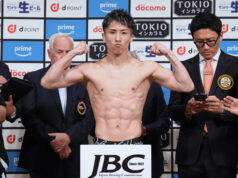By Norm Frauenheim

A difficult year got a lot tougher in its final week. Howard Davis Jr. died.
Davis’ death Wednesday after a battle with lung cancer was confirmed Thursday, New Year’s Eve and a sober reason to mourn the loss of a fighter who was the symbolic face of better days.
For younger generations, Davis might not mean a whole lot. Truth is, he was forgettable as a pro, which is the only part of the business that gets much attention anymore.
He was a journeyman-like 36-6-1 and was 0-3 in fights for major titles. He lost a unanimous decision in 1980 to Scotland’s Jim Watt in Glasgow for the IBF’s lightweight belt. The cards went against him in a 1984 split-decision loss to Puerto Rican Hall of Famer Edwin Rosario in San Juan, also for the IBF’s 135-pound version of the title. Buddy McGirt knocked him out at New York’s Felt Forum in the first round of a 1988 bout for the IBF’s 140-pound crown.
The pro record prevents him from induction to the International Boxing Hall of Fame. But he belongs there – just as surely Cuban heavyweight Teofilio Stevenson does – in some category for what he did and meant to the Olympics, an international event if there ever was one.
Sylvester Stallone is a Hall of Famer because of what his Rocky role did for the game. Yo, if Stallone is in the Hall, there’s got to be some room in there for Davis and Stevenson.
Davis, who died at home in Florida at 59, came from an era when Americans still watched and cared about Olympic boxing. He was on the fabled 1976 team, the best ever in U.S. history and the genesis of what would become the 1980s, a heyday in the pro game.
In hindsight, we remember the ’76 Olympics for Sugar Ray Leonard, who went on to one of the greatest pro careers in history.
In the public imagination, Leonard’s brilliance as a pro seemed to heighten his status as the star of that American team.
Forgotten, however, is that Leonard wasn’t even voted the most outstanding boxer of those Games. Davis, the gold medalist at 132 pounds, was.
He got a trophy called the Val Barker Award. For the record, Barker was the UK’s amateur heavyweight champion in 1891, five years before the modern Olympics began in 1896. I didn’t know who Barker was. I’m not sure anybody does, not even the winners.
It would be unfair to Barker’s descendants to ask that the Award be re-named for Davis. But it is fair to ask that the International Olympic Committee and/or USOC somehow remember Davis with an award in his name. Nobody has exemplified the Barker exemplifies more than Davis.
Three days before his first Olympic bout, his mom, Catherine, died from a heart attack. That part of the story and more has always made me think of Davis as the true face of that ‘76 team.
He fought without an agenda or an eye on what a gold medal might be worth to him as pro. At the sound of an opening bell, it was only clear that he fought because he loved it. At ringside, Howard Cosell noticed. The iconic broadcaster marveled at a dance highlighted by the choreographed balance between hand speed and footwork. Cosell compared him to Ali.
In Davis, there was a genuine expression of joy that has somehow been extinguished in the chase for money. Yet, he was nobody’s fool, either.
“Europeans take a lot of punches,’’ he told Sports Illustrated in 1976. “They get cut and looking ugly is just part of the day’s work. But I don’t want to be ugly. I’m not crazy.’’
Wasn’t angry, either.
Even after a disappointing pro career, there were few complaints. Even after the shock of being diagnosed with cancer last summer, he vowed to fight on. He seemed to say it as though he was looking forward to making cancer miss. It didn’t. Rest In Peace, Howard Davis Jr. I wouldn’t have been a fan without you.











